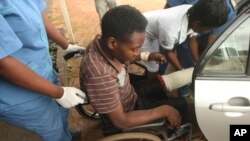Zimbabwe Human Rights Association (ZimRights) says the southern African nation may hold bloody council, parliamentary and presidential elections next year.
In its 2021 State of Peace Report launched in Bulawayo on Wednesday, ZimRights said there are current indicators that Zimbabwe may be plunged into a political crisis next year.
ZimRights recently conducted a research on peace in several communities in Zimbabwe.
ZimRights director, Dzikamai Bere, is quoted in the report as saying, “Zimbabwe is on the brink of what is likely to be a bloody 2023 election. All signals point to that tragic reality. It is therefore important that we take time to reflect on what we all can do to build and preserve peace in such a volatile environment.”
In this report, ZimRights said, “Over 50% of the community activists acknowledged that they were living in a state of fragile peace which we call negative peace. They are uncertain of what the future holds. There are no peace fundamentals in the communities to sustain ‘the silence’ they are currently experiencing.
“There was consensus across all the communities that participated in the report that elections presented a nightmare rather than an opportunity. Many community members are expecting bloodshed ahead of the 2023 election. They attribute the violence to violent nature of the ruling party. In addition to the violence, communities have no confidence in electoral systems’ capacity to deliver democracy. Many are convinced that the election outcome is predetermined because the institutions are captured.”
ZimRights said, the communities highlighted that they live in communities that are highly polarized along political lines. “This is cutting across all sectors of society. Political alliances determine access to resources and the enjoyment of basic rights. Access to food aid is dependent on political allegiance.”
In terms of traditional leaders and peace, ZimRights said communities observed that traditional leaders are many times forced to join politics on the side of the ruling party.
“As a result, they end up being conflicted and participating in manipulation of food aid and electoral processes. This is undermining confidence in the institution of traditional leadership which is supposed to be the sacred custodian of values and culture.”
Many participants noted that civil society organizations are doing a lot in supporting peacebuilding interventions and participants noted that several peacebuilding workshops and development programmes are currently being run by non-governmental organizations.
According to the ZimRights report, communities are not seeing independent commissions being actively engaged in conflicts.
“They do not engage with reports of violence nor with the victims. They say the NPRC is not playing the role that it is commissioned to play. Many communities that are torn by violence and conflict wish they could get help from the NPRC.”
ZimRights recommended that there should be some local programmes to bridge polarization, equipping activists for peace monitoring, engaging businesses and other actors to take more interest in supporting local initiatives and strengthening the role of national human rights institutions.
The State of Peace Report is an appendage of ZimRights’ Right to Peace Campaign. The report captures key peace concerns and issues in the communities where the campaign is being implemented. The campaign is being implemented in Masvingo, Bulawayo, Matabeleland North and Matabeleland South Provinces.
About three opposition Citizens Coalition for Change activists – Moreblessing Ali, Langelihle Zonda Dube and Edson Chinembiri – have already been allegedly killed by suspected Zanu PF members. Two CCC lawmakers – Job Sikhala and Godfrey Sithole – are in remand prison facing charges of inciting violence.




